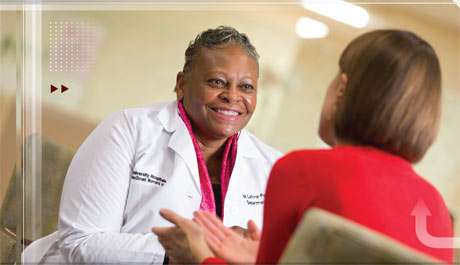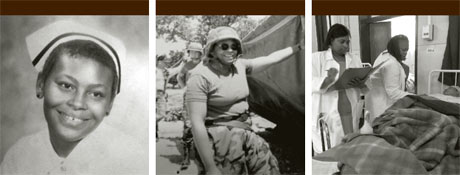"You Can Do More": Dr. Margaret Larkins-Pettigrew's Motivations Borders on a Super Power
 She transforms the demands of her inner voice into motivation and remarkable achievements. Born a Pennsylvania coal miner’s daughter, Dr. Larkins-Pettigrew launched a career in healthcare and public service as a nurse. While working, she earned a bachelor’s degree in nursing. Then, with her husband’s support, she enlisted in the U.S. Navy to attend medical school and became an OB/GYN. Along the way, she earned master’s degrees in education and international affairs and raised three children.
She transforms the demands of her inner voice into motivation and remarkable achievements. Born a Pennsylvania coal miner’s daughter, Dr. Larkins-Pettigrew launched a career in healthcare and public service as a nurse. While working, she earned a bachelor’s degree in nursing. Then, with her husband’s support, she enlisted in the U.S. Navy to attend medical school and became an OB/GYN. Along the way, she earned master’s degrees in education and international affairs and raised three children.
Dr. Larkins-Pettigrew recalls a moment of clarity that helped her sort through her wide array of interests to identify and pursue her mission.
“I was trying to find myself – where I was going to be most comfortable and where I thought I could make the most significant impact – and found my niche in medicine,” she recalled. “But what tipped me over the edge was the desire to build a career around global health education, here and across the great water, to help those less fortunate.”
Today, from a base at University Hospitals MacDonald Women’s Hospital, Dr. Larkins-Pettigrew is a medical missionary. As a UH clinician and an Associate Professor at Case Western Reserve University School of Medicine, she dedicates herself to the reproductive health of underserved women across Northeast Ohio. And the global health residency she created, called WONDOOR, is a humanitarian program that elevates healthcare in some of the world’s most impoverished countries.
Pronounced “one door,” WONDOOR stands for Women and Neonates, Diversity, Opportunity, Outreach and Research. It exists because highly preventable causes in the developing world still claim the lives of millions of newborns, and the mortality rate for pregnant women and new mothers is 235 times higher than in the developed world. WONDOOR is one of only four programs in the country that offers intense residency training programs specifically focusing on the care of women in such areas.
“We need to make some changes right here in our own backyard,” she said. “But I clearly understand we are part of a bigger picture.”

“I was trying to find myself – where I was going to be most comfortable and where I thought I could make the most significant impact – and found my niche in medicine,” she recalled. “But what tipped me over the edge was the desire to build a career around global health education, here and across the great water, to help those less fortunate.”
Striving for Equity Through Diversity
America and its healthcare system have much to gain by healing disparities in care and outcomes, says Margaret Larkins-Pettigrew, MD. She is helping University Hospitals to continue its own journey toward equity as the Edgar B. Jackson Jr., MD Chair of Clinical Excellence and Diversity.
Dr. Larkins-Pettigrew was named the Jackson Chair in 2014. UH created the position a decade earlier as the first endowed permanent staff position in an academic medical center in the United States established to promote diversity of academic faculty. It honors Edgar B. Jackson Jr., MD, Chief of Staff Emeritus and longtime advisor to UH senior leadership.
UH earned more honors in 2014 for leadership in diversity and inclusion, such as:
- No. 1 ranking among U.S. health systems from DiversityInc
- American Hospital Association Health Equity Award finalist
- 2014 Healthcare Equality Index Leader designation from the Human Rights Campaign
The Jackson Chair, said UH CEO Thomas F. Zenty III, “reflects UH’s leadership in diversity. Yet it’s also an acknowledgement that we’re committed to further improvement.”
Read more highlights from another great year in the 2014 UH Annual Report.


